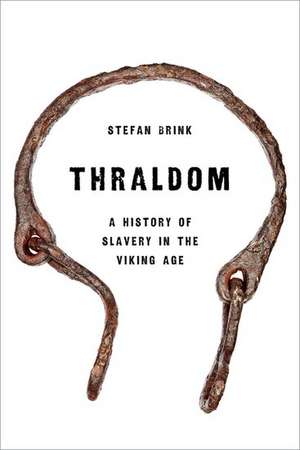Thraldom: A History of Slavery in the Viking Age
Autor Stefan Brinken Limba Engleză Hardback – 22 noi 2021
Preț: 228.26 lei
Preț vechi: 244.48 lei
-7% Nou
Puncte Express: 342
Preț estimativ în valută:
43.68€ • 46.71$ • 36.42£
43.68€ • 46.71$ • 36.42£
Carte disponibilă
Livrare economică 17-22 martie
Livrare express 12-18 martie pentru 52.35 lei
Preluare comenzi: 021 569.72.76
Specificații
ISBN-13: 9780197532355
ISBN-10: 0197532357
Pagini: 408
Ilustrații: 39
Dimensiuni: 221 x 163 x 36 mm
Greutate: 0.68 kg
Editura: Oxford University Press
Colecția OUP USA
Locul publicării:New York, United States
ISBN-10: 0197532357
Pagini: 408
Ilustrații: 39
Dimensiuni: 221 x 163 x 36 mm
Greutate: 0.68 kg
Editura: Oxford University Press
Colecția OUP USA
Locul publicării:New York, United States
Recenzii
Timely, relevant, thoroughly researched and assembled by one of the foremost authorities on Old Norse law, Old Norse place-names, and the Old Norse language, this has to be the definitive work on slavery in the pre-historical Old Norse world. It encourages us to question of our many previously held ideas about slavery in the Old Norse and Germanic world.
This study, based upon eminent insights into linguistics, history and archaeology, fills a definite gap. It is a great contribution to Viking Age studies and to studies of slavery in general.
Stefan Brink is at the top of his field and no one is better equipped to do justice to the difficult and still underexamined topic of Viking slavery. Brink's interdisciplinarity is masterly as he weaves together his sources drawn from historical documents, runic inscriptions, Icelandic sagas, early law, place names, personal names, and archaeology into a cohesive narrative. By combining his analysis of the sources on the Viking Age with an impressive historical depth and an anthropological approach to slavery, Brink provides readers with a deep understanding of unfreedom in the early history of Europe well beyond the borders of Scandinavia.
Karen Bek-Pedersen, who translated this work from a Swedish version, deserves high praise for an easily readable and learned book that deals even-handedly with numerous disciplinary specialties.
This is an important book for students and researchers concerned with the Viking period, a work of formidably scholarly research by a writer with a probably unparalleled knowledge of the subject.
The book stands as a welcome provocation to longstanding assumptions about how slavery worked in medieval Scandinavia, and as a challenge to confront the ambiguities of our sources in creative and diverse ways.
Stefan Brink's conclusions, which are sometimes unexpected, will certainly be debated [...] Nevertheless, the method he uses and the erudition he displays are to be admired.
This study, based upon eminent insights into linguistics, history and archaeology, fills a definite gap. It is a great contribution to Viking Age studies and to studies of slavery in general.
Stefan Brink is at the top of his field and no one is better equipped to do justice to the difficult and still underexamined topic of Viking slavery. Brink's interdisciplinarity is masterly as he weaves together his sources drawn from historical documents, runic inscriptions, Icelandic sagas, early law, place names, personal names, and archaeology into a cohesive narrative. By combining his analysis of the sources on the Viking Age with an impressive historical depth and an anthropological approach to slavery, Brink provides readers with a deep understanding of unfreedom in the early history of Europe well beyond the borders of Scandinavia.
Karen Bek-Pedersen, who translated this work from a Swedish version, deserves high praise for an easily readable and learned book that deals even-handedly with numerous disciplinary specialties.
This is an important book for students and researchers concerned with the Viking period, a work of formidably scholarly research by a writer with a probably unparalleled knowledge of the subject.
The book stands as a welcome provocation to longstanding assumptions about how slavery worked in medieval Scandinavia, and as a challenge to confront the ambiguities of our sources in creative and diverse ways.
Stefan Brink's conclusions, which are sometimes unexpected, will certainly be debated [...] Nevertheless, the method he uses and the erudition he displays are to be admired.
Notă biografică
Stefan Brink is Professor of Scandinavian Studies at the Institute of Nordic Studies at the University of Highlands and Islands, and Professor and Researcher at the Department of Archaeology and Ancient History at Uppsala University, Sweden. He is an Honorary Research Associate at the Department of Anglo-Saxon, Norse and Celtic, University of Cambridge, and formerly the Sixth Century Chair of Scandinavian Studies at University of Aberdeen. He is also a Member of the Royal Swedish and the Royal Scottish Science Academies. His previous books include Namenwelten (2004), The Viking World (2008), Sacred Sites and Holy Places. Exploring the Sacralization of Landscape Through Time and Space (2013) New Approaches to Early Law in Scandinavia (2014), and Theorizing Old Norse Myth (2017).
